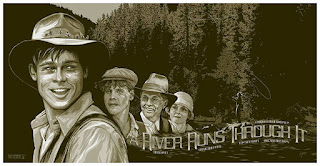It was Henry Thoreau, author, philosopher and sometime angler, who wrote that "some men fish all their lives without realising it's not the fish they are after." The Fly Fisher's Club express the same truth but, being predominantly ex public school types, chooses to do so in Latin, their club motto being "Piscator non Solum Piscatur" which roughly translates "it is not all of fishing to fish."
Now, I can blank as graciously as the next man, and fully appreciate that there's more to angling than the mere capture of fish, but such sentiments wear thin when you can't actually go fishing to test them out. It's now 6 weeks into the New Year, and I've only fished once (an ignoble blank while pike fishing a flooded river) due to a nasty virus which has seem me cancel two fishing trips, and shows little sign of abating.
All of which has meant that my "fishing" has been of the fireside variety, an internet, printed material and daydreaming activitiy, that, although not without its pleasures, is no rival to the "real thing". In the same period of time, my regular fishing partner Pete has visited our favourite perch hole twice, once catching a large net of boldly striped fish on floatfished worm, and on the other landing this beautiful 2 pounder while dropshotting.
Fortunately, when he texted me to tell me about his success, I was in the middle of a 15 hour virally induced sleep marathon, and so was spared the "I should have been there" self-pity that I would otherwise have wallowed in.
I've been reading a good book (or two) in my absence from the bank, one of which despite mentioning fishing in only one of its chapters, will strike a chord with any angler. "The Wild Places" by Robert Macfarlane is an exploration of what's left of Britain's dwindling wilderness. A beautiful elegiac bit of prose that takes the reader to windswept coasts, desolate moorlands and mountain crags, and briefly takes in a sea trout fishing session. The writing style matches the landscapes he describes, rugged and challenging yet strangely beautiful.

As an angler, who fishes, in part, to become one with the landscape, even when the book has its setting away from water, because, like Norman Maclean, "I am haunted by water", I found myself making connections between it and my fishing, all of which got me thinking about my few experiences of genuine wilderness fishing, all of which have been on the American continent. I am a seasoned African traveller, but have only ever fished in the sea while in Africa, twice off Zanzibar, once off Bagamoyo and once off Tanga, all in the Indian Ocean. My wilderness experiences of Africa have all involved land-based flora and fauna, although I have gazed longingly into the crocodile and hippo infested Great Ruaha River and wished I could fish it on several occasions!

My first experience of wilderness fishing was in Canada, while staying in a lakeside cabin, deep in bear country beside Clear Lake, once the stamping ground of the legendary faux native Indian and early conservationist Grey Owl. It was here that I caught my first ever fish on the continent, a tiny walleye that succumbed to a small rubber grub and jig head, straight retrieved in short hops to the shore. We walked, canoed and fished, and saw three bears in five days, and I felt, for a few days at least, like a real outdoorsman.

My second experiences of wilderness fishing were in 2013, on the same continent, but this time in the USA, in Missouri and Arkansas. I fished with two American friends from a shiny red bass boat, that swept across the water at 60 mph, and from which we explored bays and shorelines, casting crankbaits, spinnerbaits, poppers and soft plastics. I caught a brace of spotted (or Kentucky) bass, and some gloriously coloured little bluegills, which attacked lures half their size with aggressive abandon.
The highlight of this particular trip was when my companion, Dave, caught a monstrous, prehistoric looking, gar, a tooth laden, angry looking fish that jumped clear of the water on several occasions and gave a great account of itself in its efforts to evade capture.
My final session of that trip saw me wading into the shallows of Bullshoals Lake, and catching scores of small pan fish, as the Americans term them, on floatfished worms, referred to by the locals as "nightcrawlers". There's something about being out in wilderness places that awakens a sense of the transcendent and numinous, and while I'd contend that the man who said that he's "closer to God in the outdoors than he is when in church" is a man who just hasn't found the right church yet, it is my experience that time spent in the magnificence of creation invariably enlarges my vision of its Creator. Fishing as a sacrament, perhaps?










